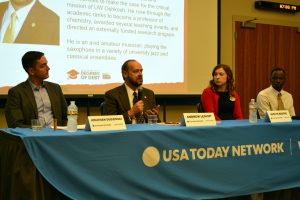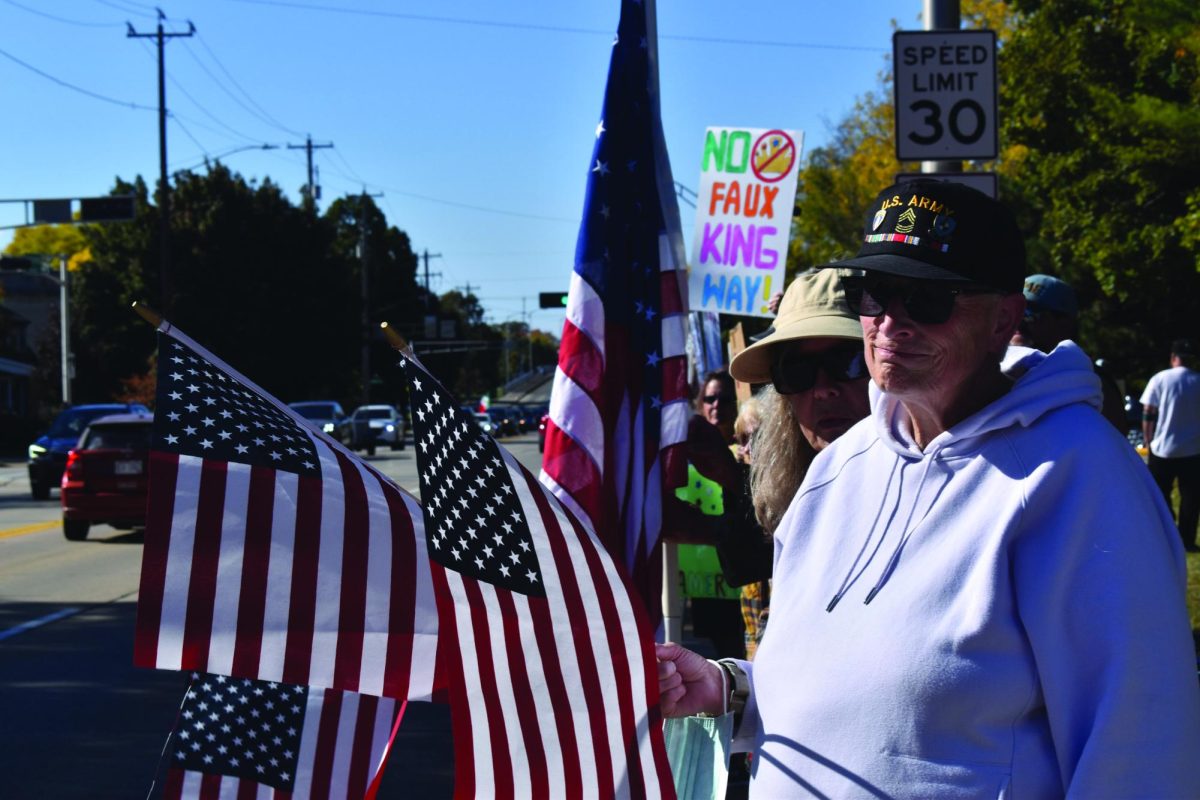
USA TODAY NETWORK-Wisconsin kicked off its Degrees of Debt series to let readers know about the seriousness of student debt, provide information to students and families and to talk about solutions to make college more affordable and accessible.
Rory Linnane, one of the main reporters for the Degrees of Debt series, said the goal of the series is to get a dialogue going about student debt.
“Our hope is to start a conversation with students, members of the community and administrators about the barriers that students are facing and what the university community can do to address that, as well as what the state can do to address that,” Linnane said.
According to Linnane, the idea for the series sparked after learning about the debt her friends are in.
“As a recent graduate myself, I just have a lot of friends who are talking about all the student debt they’re in and I see them struggling to pay it off and making decisions about their lives based on trying to pay off their student debt,” Linnane said. “I just knew that this is an issue on a lot of people’s minds right now and thought that it would be worthwhile to dig into, start some conversations about and look for some solutions.”
In addition to the series, USA TODAY is holding rallies at Wisconsin colleges to raise awareness about the debt crisis. So far, there have been rallies at Lawrence University, UW-Green Bay and UW Oshkosh. The final rally will take place at UW-Stevens Point. Video footage of each rally can be found on both the Oshkosh Northwestern and USA TODAY websites.
Noell Dickmann, the education reporter for the Oshkosh Northwestern, said similar topics have come up at each rally.
“A lot of it has been financial literacy, how to prepare for college, and those issues that students should understand what they’re getting themselves into,” Dickmann said.
The UW Oshkosh rally was held on Oct. 18 at the Alumni Welcome and Conference Center. Community members gathered to hear a selection of panelists discuss the debt crisis. These panelists included Chancellor Andrew Leavitt; Oshkosh Student Association President Austyn Boothe; Kevin Cathey Jr., president of the Black Student Union and research coordinator for UWO’s division of Academic Support of Inclusive Excellence; and Jonathan Dudzinski, a recent graduate of UWO, who now works as a financial advisor.
Several points were made by each of the panelists at the Oshkosh rally that interested UWO freshman Alyssa Mathes.
“I walked in not expecting it to be that interesting, but I learned a lot about student debt,” Mathes said. “They made a good point that students should focus on their studies and not on jobs during the semester. I also liked the fact that there were students on the panel. It was interesting to hear things from their point of view.”
Leavitt said he is concerned about the high price of college.
“I’m worried because I think our students graduate with too much debt,” Leavitt said. “We’re working very hard in terms of trying to make college more affordable.”
Leavitt also said he wants candidates in the upcoming election to hear about college affordability.
“I’d love to see the United States Senate and the House of Representatives lower the interest rate on the Stafford Loan program; it’s ridiculously high,” Leavitt said. “There needs to be greater predictability and stability in programs.”
According to Boothe, student debt isn’t the only economic problem that is affecting students.
“I think that the UW System is in a particularly tough place, because it kind of seems that our legislators aren’t valuing higher education like college students are,” Boothe said. “We see budget cuts, and that really hurts students in the long run as well.”
Dudzinski shared his advice on how students can make their college experience as cheap as possible.
“When you’re trying to figure out how to make this work, the cheapest way to get through this experience is to get out quickly,” Dudzinski said. “Plan it out ahead of time, know what you’re going for, keep your nose to the grindstone and get out in four years.”
Dudzinski also gave advice about how students can complete their college education quickly.
“I have a very odd suggestion which is during the semester, don’t work,” Dudzinski said. “While debt is scary, you come out ahead to take out a little bit of debt while you’re in college and focus on your academics.”
Leavitt added that working while in college is not helpful in the long run.
“We have a lot of students who drop in and out of college frequently,” Leavitt said. “They go out, make money for a while, they come back. I don’t think that’s actually the most efficient way to go to college, and it’s certainly not the cheapest.”
Cathey shared his own advice for students who are paying for college.
“The biggest thing is to keep your GPA up, because we have different scholarships, loans and grants,” Cathey said. “Your GPA really dictates the level of scholarship or grant that you can have.”
Cathey added that being prepared for college is an important part of handling education.
“It’s all about preparedness, and that first semester is very critical,” Cathey said.
Cathey said there are different ways for students to tweak the system and make their education cheaper.
“Sometimes it’s smarter to go to a two-year school for a specific degree rather than to prolong it and to go four years, or it’s smarter to go and to get your associate’s and then to go back for your bachelor’s,” Cathey said.
Leavitt also said attending a two-year school is a smart idea.
“Going to a two-year campus first is a wonderful way to go to college,” Leavitt said. “It’s a terrific way to go to college if family finances is the issue.
“I think everyone thinks it’s not cool to go to your local college,” Dudzinski said. “It’s also not cool to be paying off your student loans when you’re 45. If you can go to the two-year, you can save a ton of money there. It really just puts you a lot further ahead.”
Leavitt said having a college education is worthwhile no matter what degree you go for.
“There is no such thing as a worthless college degree,” Leavitt said. “All degrees have merit, all degrees have value.”
Dudzinski recommended that students choose their career based on passion, not pay.
“When you’re looking at the economic side of it, there’s probably some majors that just predispose you for a higher starting salary,” Dudzinski said. “But your work is going to fill up a large part of your life, and boy, would it be a depressing life to work for that entire time and not enjoy what you do. If you don’t love what you’re doing, then it’s just not going to be a very good life.”












